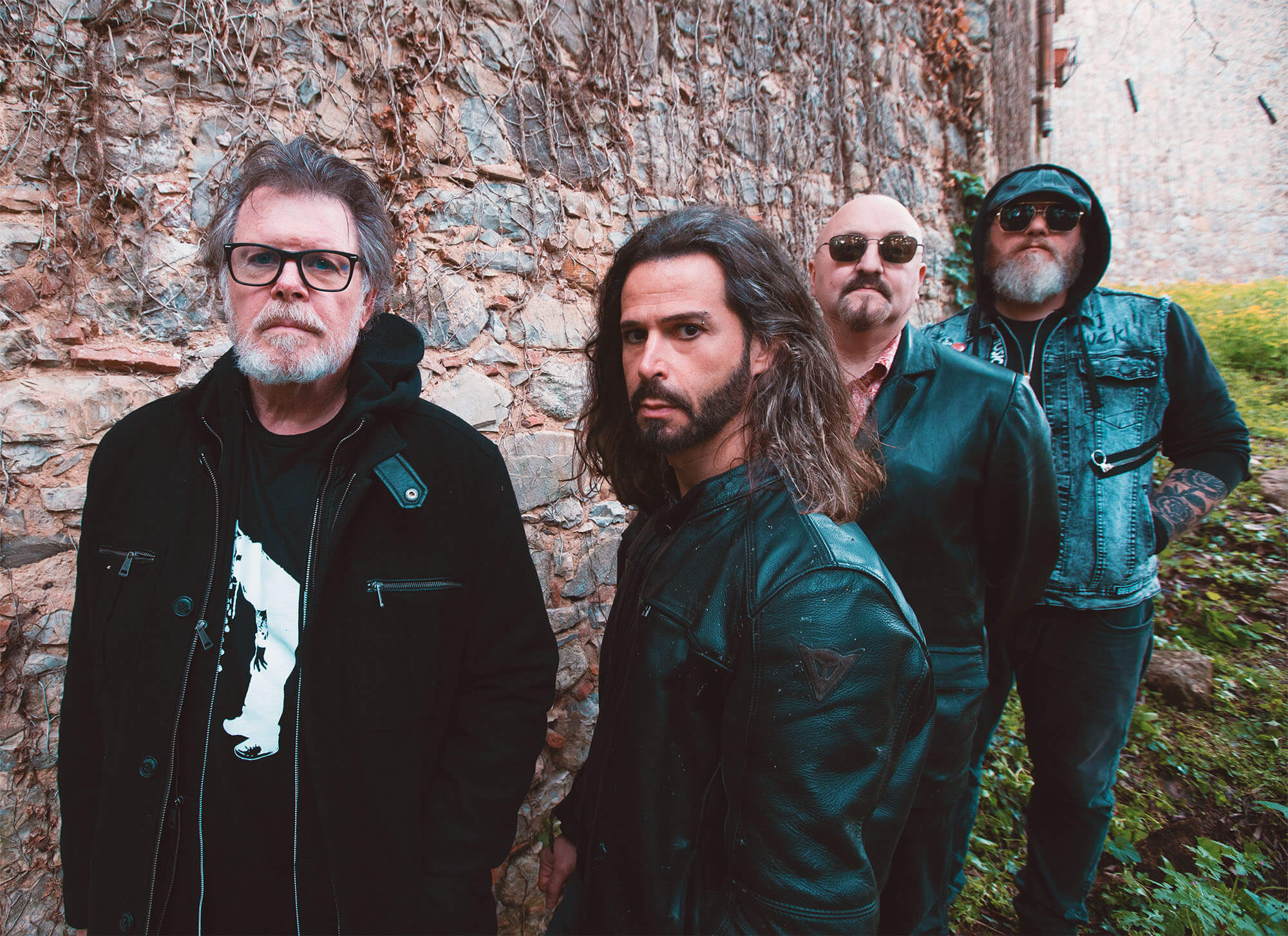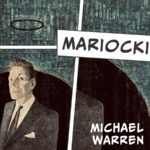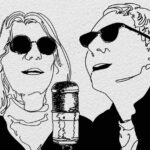
O.R.k (credit: Benedetta Balloni)
Colin Edwin has always been a bassist with an ear for the unexpected. Whether holding down the low end for Porcupine Tree’s cinematic sprawl, or diving headfirst into the muscular, genre-defying world of O.R.k., he’s never been content to coast. Colin breaks down new album Firehose of Falsehoods, the strange state of the world, and why, despite it all, musicians will always find a way forward.
Firehose of Falsehoods, a potentially provocative title. Can you tell me about the concept behind that phrase?
The album is not a concept album in any way, but the title was meant as contrary reference to what we’re doing as musicians and songwriters. We spend all our time expressing ourselves with sincerity and trying to articulate our emotions whilst paradoxically, we’re surrounded by a world where doing the exact opposite and spouting whatever you like in order to simply further your own ends is commonplace, even if it’s divisive, dangerous bullshit. It seems harder than ever to really know what the truth of anything is, but in O.R.k. we’re always trying to be true to ourselves, and all told, Firehose of Sincerity doesn’t really have the same ring to it.
You call this album harder-hitting and more muscular. What changed in O.R.k’s sonic DNA since Screamnasium?
The heavier elements have always been present in O.R.k., but this time they’re more prominent than before. That might have a lot to do with Carmelo Pipitone fully embracing the electric guitar for the last few years, whereas he played acoustic guitar exclusively in the early days and now uses it more sparingly. Inevitably, he’s brought a more forceful sound to the table. I also think the newer songs are more focussed than before, there’s a directness which keeps things grounded.
You’ve worked across rock, prog, ambient, and jazz. Where does Firehose of Falsehoods fit in your personal discography?
O.R.k. sort of combines a lot of previous things for me. While there’s no jazz, we do take time to stretch out and improvise at certain points in a live show. There are softer, ambient moments where I can play more lyrically and use various effects. There are some challenging moments too, I hesitate to describe O.R.k. as prog, but in revisiting some of the new songs to make sure I have my parts down in preparation for the upcoming gigs, I discovered that one of the tracks had a whole lot more going on with odd time signatures than I thought. Whilst recording, I’d simply absorbed the phrases without really taking on board that it was alternating between 4/4, 9/4 and 5/4, so I guess it is prog after all!
You started on bass at 15 but grew up in a musical household. Was there a moment where you felt you’d truly found your voice?
I never really spend much time reflecting on my approach but I did realise a few years ago that I was in a strange sort of musical niche and that I had something of my own to offer. I often find myself being drawn into a particular area, although I can’t always articulate what that is. As you said, it’s somewhere between prog, jazz, rock, psychedelia and ambient. I can’t define it exactly but I know it when I hear it!
From Porcupine Tree to O.R.k to Ex-Wise Heads, how much does your bass playing shift between projects, and where do you feel most at home?
Every ensemble or collaboration is really about each blend of personalities and how they fit together in a creative sense. I am more or less doing the same thing a lot of the time, which is to be supportive and sympathetic to whatever is going on, but the role changes by degrees from time to time. In Porcupine Tree I was generally in a fully supportive rock band bass player role. With Ex Wise Heads, wether as a duo or trio it was about giving Geoff Leigh the grounding to really stretch out as soloist, with Twinscapes I had much more space to do a lot of stuff with effects and textures. But things bleed into each other, and nothing is forgotten, so I might take something from one thing to another, although it’s usually not a conscious decision, more an instinct developed from experience. I find O.R.k. to be a very satisfying context because it covers a lot of the areas I am comfortable in, whilst also offering a good deal of unpredictability and opportunities for creativity. I wouldn’t say that there’s any one place I am more at home, perhaps I have a form of creative restlessness.
Your studio is called Nightspace because that’s when you found time to create. Do you still find creativity strikes at night, or has your rhythm changed?
After many years, I’ve been lucky enough to have moved out of Nightspace, which actually was a basement, and into a studio space with actual daylight which has been rechristened “Hubspace” as it’s meant to be an all round creative space. Once I became a parent, pretty much the only uninterrupted time I had was late at night, but I’ve always been an owl and I still find the hours of darkness very productive, there’s something about being awake when the world is sleeping that I’ve always liked, it’s usually much quieter of course but it’s almost as if there’s less psychic noise too.
You’ve worked with Pat Mastelotto, Geoff Leigh, and countless others. What’s the secret to a good creative partnership?
I am not sure if there’s any wisdom I can share there, there’s been a certain amount of luck involved in that I’ve connected with likeminded musicians and things generally come easily. Of course nobody hears the things that didn’t work out, and there’s been a few.
Has touring altered any of O.R.k’s songs in unexpected ways?
We’re never just about regurgitating the studio recordings live but letting them have a life of their own, or sometimes rearranging things to make the show flow better. One of the unpredictable and enjoyable things that can happen as the music gets presented to the audience, is that sometimes people connect with something in a way you never expected and a particular track gets a lot more reaction and attention than expected. ‘Someone Waits’ often became a really moving piece to play, whilst ‘No Need’, which was quite spontaneous on the album, ended up being a proper moment of Carmelo craziness in a way we never expected.
You’ve spoken about music tapping into subconscious archetypes. Have you ever played something and felt like it came from somewhere deeper than you?
Absolutely, there’s a Gestalt to any group, and if you’re open to things, it can sometimes feel like the music is playing you. It’s almost as if you’re discovering something that’s already there and highlighting it. It’s also possible to make connections with other musicians and listeners that are deeper than everyday interactions, and those connections can sometimes be simple and playful or more profound, but they are there nonetheless.
‘I’m Afraid of Americans’ was a rare political statement for O.R.k about 8 years ago. Do you think music should engage more with today’s chaos?
I really hoped “I’m Afraid of Americans” would feel out of date by now, but it doesn’t, sadly. One of the major world events that occurred as I became an adult was the fall of the Berlin Wall. I visited Berlin recently and went to a life size exhibit with a realistic recreation of looking over the wall towards the East at the height of the Cold War, I was hit by the realisation that the optimism of the wall falling and the changes it brought, is maybe something that a lot of people my age were positively affected by, in that seeing a seemingly impossible situation change for the better and become a reality, we developed a hopeful outlook. But the world has undeniably gone backwards the last decade or so and we’re slipping into somewhere unknown and dangerous, and looking at the exhibit I actually felt quite saddened. Anyway, yes, O.R.k. isn’t a political band, but I have no problem with any artists or musicians that are. Politics is a universal thing after all and getting an important, defiant or hopeful message across in music, or any art form is a good thing to do, we shouldn’t be afraid to think or express dissent.
Music is evolving, AI is writing songs, streaming algorithms shape what people hear. Where does that leave the artist?
The pace of change is dizzying. I think it’s fair to say the music business is totally unfathomable because you really can’t predict anything anymore and who knows what is coming next. The development of AI is both fascinating and terrifying on a number of levels, but what hasn’t changed is the basic need for human expression, connection and communication. Music is a big part of that, so for any artist who really cares about what they do in the most fundamental way, nothing has changed at all. The business is still a mess and I can’t see that changing for the better, but we’ll just have to keep building on what we have, however we can.
With Firehose of Falsehoods set for release in March, what does the rest of 2025 look like for you: touring, new collaborations, or unexpected creative detours?
O.R.k. will be touring in the Spring, and we hope to follow up with more dates later this year. I’ll be working with Gaudi on another Kosmisches Trio album, we have a few live dates coming up too, and I am steadily working on another album with guitarist Jon Durant, but we’re taking our time on that and it will be a different angle to what we’ve done before.




